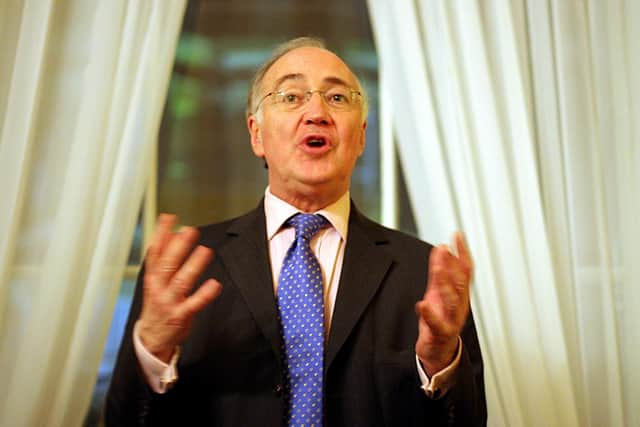The Tory Party needs to start respecting differences amongst voters or risk defeat like in 2005 - Justine Greening
The answer the electorate gave Michael Howard was a resounding ‘no’. No, they were not thinking what the Conservative Party was thinking. Yet in some places, the party was able to win. That night the Party had 33 new MPs elected. I became a Member of Parliament for the marginal seat of Putney in South West London, winning it from Labour.
Putney was the antithesis of the shire Tory seats that formed the rump of the Parliamentary Party left standing after Blair’s landslide victory in 1997. Urban and diverse, it had the youngest profile demographically of any constituency in the country other than next door Battersea, winning there, by engaging a whole community and not just focusing on areas that already supported us proved that with a fresh, inclusive approach we could win the support of a whole range of voters who had previously turned their back on us.
Advertisement
Hide AdAdvertisement
Hide AdWe never won Putney by suggesting that its challenges should be resolved by ‘fixing’ other people. To win there meant learning from rather than haranguing voters who weren’t on our side. It meant working hard on their priorities to show real credibility, going well beyond, not just talking about them. It meant a positive, practical and inclusive message of what we wanted to achieve for ourselves and our country, not a negative, exclusive message of who needed to get sorted out, or who was somehow standing in our way. It was about pulling our community together around what mattered to all of us, not picking the areas to divide one section from another. It never meant deriding the lives or lifestyles of others - locally or in other parts of the country - who were different. Instead it meant respecting that difference.


So listening to some of the speakers at the National Conservatism Conference earlier this week, which was attended by MPs and Cabinet Ministers, it felt like the clock had been turned back twenty years. It was a brand of intolerant, ‘snowflake’ Conservatism scared of any other viewpoints than its own, seemingly threatened by the diversity of the world we live in today and its differing opinions.
It’s the opposite of that winning approach and it’s bad politics that turns off whole swathes of the electorate, as the dire polling for the Conservatives and its performance in local elections earlier this month clearly shows. It’s also not a smart political strategy to suggest to the public that Ministers aren’t really in control because there are many shadowy forces able to successfully frustrate you. News Alert: If you say you can’t run the country, the voters will find a party or politics that can.
But intolerance of difference also matters because it suggests to the wider country that the Conservative Party culturally isn’t capable of delivering social mobility for Britain. That’s despite the oft-repeated mantra that levelling up matters because ‘talent is spread evenly, but opportunity is not’.
Advertisement
Hide AdAdvertisement
Hide AdIf there are elements giving the impression that some people are more equal and deserving than others, then they’ve failed to understand equality of opportunity at the first hurdle. You either believe in equality as a principle or you don't. Too many of the voices at National Conservatism seemed like they didn’t.
A crucial part of the solution on social mobility is having public services that are designed to tackle the structural problems that lead to inequality of opportunity, whether in education, transport, health, housing, justice or any other area of national and local Government. It’s a reform agenda with real purpose. But it needs a Conservatism that embraces social justice and runs towards the challenges of the disadvantaged and vulnerable, not one that dismisses the interests of so many groups out of hand.
Winning elections and changing society is about building coalitions that can work together for positive change. It involves understanding that those different perspectives actually mean better solutions, rather than worse ones. Businesses have realised this for some time - the evidence is clear that more diverse teams generate better financial returns for their investors.
As leader of the Party and Prime Minister, Rishi Sunak cannot simply be a passenger on the Conservative ship, supposedly at the helm, whilst others try to steer it in whatever direction they fancy. All parties have a range of views. However, if Sunak thinks those expressed at the National Conservatism conference portray a version of the Party that is not what he thinks it stands for, and I believe they are, then he should stand up and say so. Otherwise all the electorate hear are the right-wing voices reported this week. And the public then take those voices to be representative of the wider party, even when they are not.
Advertisement
Hide AdAdvertisement
Hide AdThis is a key moment for the Conservative Party. To deliver social mobility and social justice, it has to act like a party that is at ease with and part of the wider society that is Britain today. I know there are many in the Conservative Party who absolutely represent and reflect that ethos of equality of opportunity. But they’ll need to stand up and call out those around them who don't with ever more vigour in the coming months, if they are to stop those voices from turning off the electorate and taking us back to where we were in 2005. In Opposition and out of power.
Justine Greening, born and raised in Rotherham, was Secretary of State for Education from 2016 to 2018.